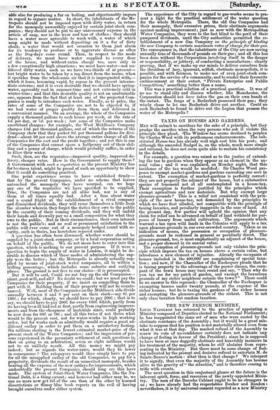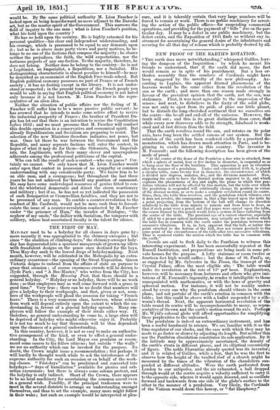THE NEW FRENCH MINISTRY.
Lows NAPOL1ON has returned to the practice of appointing a Ministry composed of Deputies elected to the National Parliament; he has reappointed the same set of men who were ousted by the obstinate resistance of the Assembly ; but it would be a great mis- take to suppose that his position is not materially altered even from what it was at that day. The marked refusal of the Assembly to renew its vote of no-confidence certainly does not indicate any change of feeling in favour of the President; since he is supposed to have been at once doggedly obstinate and knavishly insincere in his treatment of the majority, whom he still abstains from repre- senting in the Ministry. But there must be some change of feel- ing indicated by the prompt and decisive refusal to entertain M. de Sainte-Beuve's motion : what then is that change? We interpret it to signify, that even the majority of the Assembly has beoome alive to the gravity of" the situation," and is therefore ceasing to trifle with events.
The next question in this conjectural glance at the future is the inherent spirit, force, and resources of the newly-appointed Minis- try. The men of the Baroche Cabinet ought to be no strangers to us ; we have already had the respeetables Ronher and Bandon: nevertheless, it is by universal consent regarded as a new Ministry would be. By the same politieal authority M. Leon Faucher .is looked upon as being henceforward no mere adjunct to the Baroche set, but as the master spirit of the Government. This narrows the field of inquiry to the one man : what is Leon Faucher's position, what his hold upon the country ? He has no hold upon the country. He is highly esteemed for his personal qualities—his clear and independent understanding, and his courage, which is presumed to be equal to any demands upon it ; but as he is above mere party views and party motives, he be- longs to no one of the factions that compose the majority ; he shares neither the prejudices, the faith, the wild expectations, nor the tortuous projects of any one faction. To the majority, therefore, he does not belong. Neither does he belong to the country—he is not a Legitimist, an Imperialist, a Republican, nor a Socialist. His distinguishing characteristic is almost peculiar to himself—he may be described as an economist of the English Free-trade school. But English political economy possesses no part of France or of French society ; it has no footing except in the library. It is not under- stood or respected; in the present temper of the French people you would be safe in saying that English political economy is not hated only because it is not known. M. Leon Faucher is the repre- sentative of an alien idea.
Neither the situation of public affairs nor the feeling of M. Faucher will suffer him to be a mere passive public servant : he bas avowed that he intends to make some active effort to revive the industrial prosperity of France ; the brother of President Du- pin has let out that there is an intention to revise the Constitution before 1852; and we must presume that M. Faucher will conduct this double operation in a conservative said economical spirit. But already Republicanism and Socialism are preparing to resist. The selection of the new Ministers therefore indicates, not peace, but war. Once let there be war between the Government and the Republic, and many separate factions will enter the contest, in hopes of what it may do for them—the Orleanists, the Imperial- ists, the Legitimists, with their many clever and unscrupulous adherents among the professional politicians of the capital. Who can tell the result of such a contest—who can guess ? Cer- tainly we cannot. We only know that M. Leon Faucher would enter upon that contest in possession of no sympathy or common understanding with any considerable party. We know him to be an able man, and a courageous ; but throughout the last three years he has not achieved for /himself any position of command. He may have some undeveloped resources of genius fitted to con- trol the whirlwind democratic and direct the storm reactionary and military; but if so, he has not as yet indicated the possession of such Bonapartist or Cromwellian faculties, and they are not to be presumed of any man. To confide a counter-revolution to the conduct of Mr. Cardwell, would not be more rash than to forecal- oulate the issue of a counter-revolution conducted by M. Faucher under "the prisoner of Ham," the invader of Boulogne, "the nephew of my uncle," the dallier with Socialism, the tamperer with soldiery, whose best-ascertained faculty is the talent for silence.



























 Previous page
Previous page